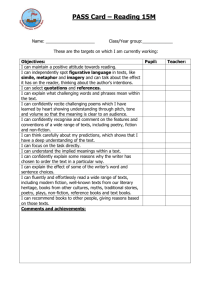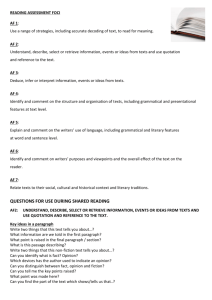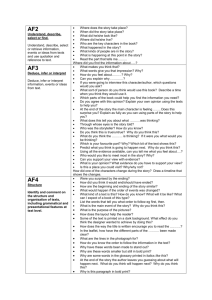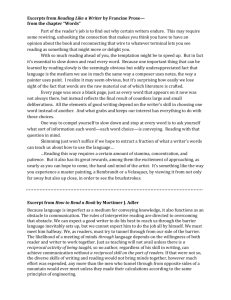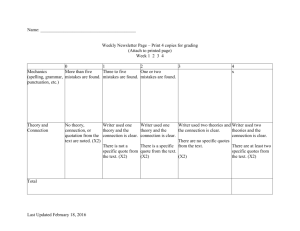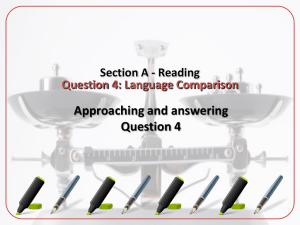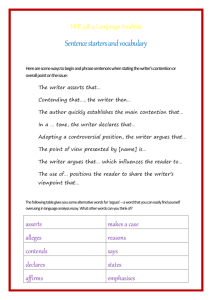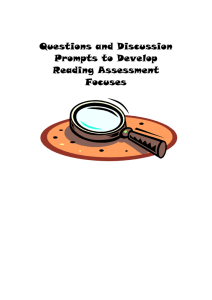handout - ABC To Read
advertisement
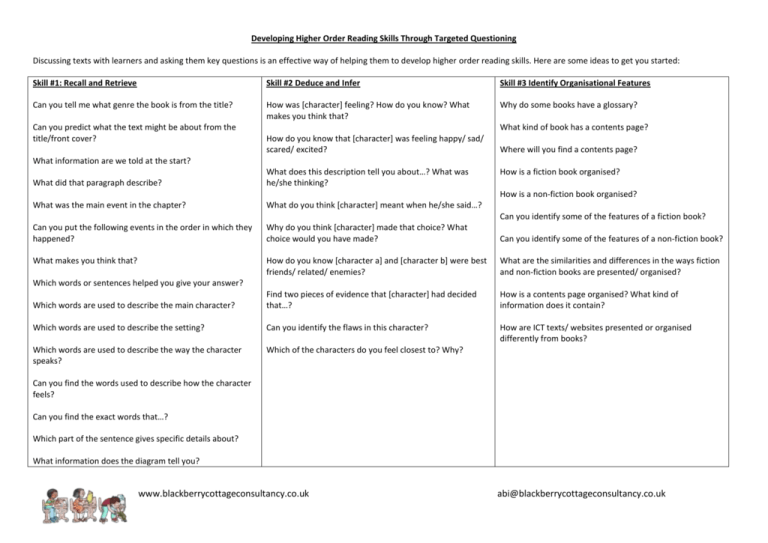
Developing Higher Order Reading Skills Through Targeted Questioning Discussing texts with learners and asking them key questions is an effective way of helping them to develop higher order reading skills. Here are some ideas to get you started: Skill #1: Recall and Retrieve Skill #2 Deduce and Infer Skill #3 Identify Organisational Features Can you tell me what genre the book is from the title? How was [character] feeling? How do you know? What makes you think that? Why do some books have a glossary? Can you predict what the text might be about from the title/front cover? What kind of book has a contents page? How do you know that [character] was feeling happy/ sad/ scared/ excited? Where will you find a contents page? What information are we told at the start? What did that paragraph describe? What does this description tell you about…? What was he/she thinking? How is a fiction book organised? What was the main event in the chapter? What do you think [character] meant when he/she said…? Can you put the following events in the order in which they happened? Why do you think [character] made that choice? What choice would you have made? Can you identify some of the features of a non-fiction book? What makes you think that? How do you know [character a] and [character b] were best friends/ related/ enemies? What are the similarities and differences in the ways fiction and non-fiction books are presented/ organised? Which words are used to describe the main character? Find two pieces of evidence that [character] had decided that…? How is a contents page organised? What kind of information does it contain? Which words are used to describe the setting? Can you identify the flaws in this character? How are ICT texts/ websites presented or organised differently from books? Which words are used to describe the way the character speaks? Which of the characters do you feel closest to? Why? How is a non-fiction book organised? Can you identify some of the features of a fiction book? Which words or sentences helped you give your answer? Can you find the words used to describe how the character feels? Can you find the exact words that…? Which part of the sentence gives specific details about? What information does the diagram tell you? www.blackberrycottageconsultancy.co.uk abi@blackberrycottageconsultancy.co.uk Skill #4: Identify Purpose of Authors’ Choices Skill #5 Identify a Writer’s Viewpoint Skill #6 Consider Historical, Cultural and Social References Why did the author choose these words to describe…? Why do you think the writer thought about this…? Have you ever come across a story/ topic/ book/ character like this before? What do the following words tell you about…? Why do you think the writer wrote this text…? Why do you think the author describes the setting as…? What is this text for? Why do you think the author describes the character in this way? Did you like/ enjoy the story/ character? Why/ why not? In what ways are these two texts similar? What part of history is this story set in? What types of people are in this text? What did you think was the most exciting part? Why do you think the author chose to write the sentence in this way? Why do you think the author chose to start a new paragraph here? Why do you think the author chose to use a question at the start? What can we learn about from reading this text? What did the writer want us to learn? Would you think that if you were living in… living as a…? What do you think the writer thinks about this character? Who was your favourite character? Why? What do you think about the ending the writer chose? Do you think this paragraph/ sentence/ word was an effective way to describe…? If this story was set now, rather than then, what effect would that have on what you think? Why do you think the author chose to use a short sentence here? Which words or phrases create suspense? Do you think the writer would still think that if she/ he were…? Has anything surprised you about the contents of this text…? Are there similarities/ differences between this text and your own life? Can you give an example…? Does the story have a moral/ message? Why do you think the author wanted to create suspense? How do these texts differ in the information they offer? Why do you think the author used this title for this text? Why do you think the author wrote the description in this way? What is revealed about the character in these lines of speech? Do you think these are accurate instructions? Were they easy to follow? Can you identify the author’s comments that show the shifting thoughts of the character? What is the high/ low point of this text? Why did the author use figurative language in the description of the setting? www.blackberrycottageconsultancy.co.uk abi@blackberrycottageconsultancy.co.uk
